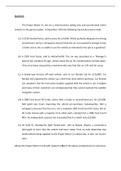Question:
The Proper Motor Co Ltd ran a retail business selling new and second-hand motor
vehicles to the general public. In December 2020 the following transactions were made:
(a) A 2018 Vauxhall Astra, sold to Jenny for £14,000. Whilst perfectly adequate for driving
around town, Jenny is unhappy to discover that the car is not powerful enough to tow
a trailer and so she is unable to use the vehicle as intended (in her job as a gardener).
(b) A 1995 Ford Fiesta, sold to Adrianfor£50. The car was described as a ‘Manager’s
Special–fair condition for age’. Adrian drove the car for 2 weeks before it broke down.
It has since been assessed by a mechanic who says that the car is fit only for scrap.
(c) A brand-new Porsche off-road vehicle, sold to Car Rentals Ltd for £110,000. Car
Rentals Ltd inspected the vehicle via a short test drive before purchase. Car Rentals
Ltd complains that the instruction booklet supplied with the vehicle is not in English
and many of their customers are complaining that they cannot operate the satellite
navigation system.
(d) A 1985 Ford Escort RS Turbo, sold to Nell, a trader in second-hand cars, for £25,000.
Nell spent two hours inspecting the vehicle pre-purchase. Subsequently, Nell is
unhappy to discover that the car is not a complete 1985 Ford Escort RS Turbo, but an
RS Turbo chassis with a majority of its other parts coming from a 1986 Ford Escort
XR3i. An independent assessor has concluded that it is worth only £10,000.
(e) An Audi X1, bearing the label ‘brand-new’, sold to Wayne. Wayne, a consumer,is
distraught to learn that the vehicle had been stolen from an Audi dealership two
weeks before being supplied to the Proper Motor Co Ltdand was, in fact, not ‘brand-
new’.
Advise the Proper Motor Co Ltd with respect to ALL of the above complaints by its customers.
, Answer:
The issues faced by Proper Motor Co Ltd (PM) deal with the statutory terms of goods
governed under Sale of Goods Act 1979 (SGA 1979) and Consumer Rights Act 2015 (CRA 2015)
within the field of commercial law. Therefore, in advising PM, the focus will be put on the
potential liabilities on PM and remedies available if the following parties, namely Jenny,
Adrian, Car Rentals Ltd (CR), Nell, and Wayne, enforced their rights under the above statutes.
To start with, since PM ran a retail business selling motor vehicles to publics and the
complaints made by above buyers concerned with business transactions in December 2020,
hence it is said that PM is qualified as a ‘trader’ under s2(2) CRA 2015. However, this does not
mean that CRA 2015 is applicable to all the situations as some of the buyers do not fall within
the concept of a ‘consumer’ under the Act, then they can only rely on SGA 1979. The
transaction within a trader and consumer below is categorized as sales contract [s5(1) CRA
2015], conversely, they are contract of sale [s2(1) SGA 1979].
In the case of Jenny, as she is purchasing the vehicle as a part of her profession in
gardening, thus she is not a ‘consumer’ and there is a contract of sale. Since Jenny was
unhappy as she demanded a powerful car to tow a trailer, but the Vauxhall Astra is incapable
to do that, the unsuitability is not on the performance of the vehicle (intrinsic factor), but on
the purpose to use it (extrinsic factor). At such, following the decision in Jewson Ltd v Boyhan,
Jenny would raise s14(3) SGA 1979 to protect her rights as the provision implied that goods
supplied under a contract for sale must reasonably fit the buyer’s purpose. The judge in BSS
Group Plc v Makers (UK) Ltd suggested the three-stages procedure to determine a breach on
s14(3): Firstly, the purpose of buyer must be communicated, either expressly or by implication;
secondly, the goods must not reasonably fit the purpose; thirdly, there must be reasonable
reliance from the buyer. On the facts, there is no evidence that Jenny had addressed her
purpose to PM, although Priest v Last provided that communication is not necessary if the
purpose is so obvious or mundane, but the ordinary objective to buy a car is not to tow a
trailer, such abnormal purpose should be delivered, as in Griffiths v Peter Conway Ltd. Hence,
the absence of communication will automatically nullify the breach of s14(3) on PM.




